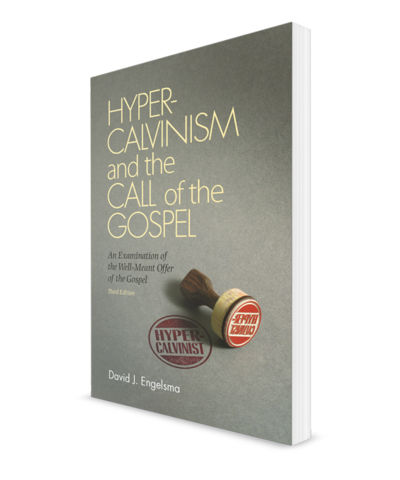Fellowship with God
By : Reformed Free Publishing Association
The truth concerning man's relation with God is one which deserves our attention and our understanding. Nothing can be more important than one’s standing before God. It is very literally a matter of life and death.
There is a relationship of fellowship between God and his people. That relationship has been called a "covenant relationship." This concept is fundamental unto a proper understanding of our duties and responsibilities before God and with men. Within the church it becomes very plain that some sort of beautiful relationship exists between God and this people of his church. It is also to be clearly understood that this relationship exists only because of and through the cross of Jesus Christ.
"Covenant" involves a coming together, a dwelling under one roof. The term emphasizes that God and his people have a basis for unity. This, we believe, is the purpose of God's revelation outside of himself—that a people might eternally dwell with him in Christ.
Read More
July Standard Bearer preview article
By : Reformed Free Publishing Association
Introduction
The Lord’s Supper in the dialogue of worship was not always understood the scriptural way we have described it in these articles. In our previous article we examined how Rome views the Lord’s Supper in worship. In this article we want to understand how and why the Reformation was used of God to restore the church to a proper understanding of the Lord’s Supper in worship.
Restoration of the gospel
When the Reformation returned the church to the truth of the gospel, everything changed also in worship. In God’s sovereign mercy, Martin Luther, who had access to Scripture, began to see the truth of the Word of God. Particularly, he saw that Scripture taught the once-for-all sacrifice of Christ on the cross that effectually atoned for the sins of all His people, so that they are justified by an imputed, alien righteousness alone.
Read MoreThe Sesquicentennial of the Afscheiding
By : Reformed Free Publishing Association
It was only a little band!
They did not belong to the noble and the wise and the rich of this world. They did not belong to those who counted for something in this world. But "God has chosen the foolish things of the world to confound the wise; and God hath chosen the weak things of the world to confound the things which are mighty; and base things of the world, and things which are despised, hath God chosen, yea, and things which are not, to bring to nought things that are" [1 Cor. 1:27].
It was by this little flock of small and despised folk that a step was taken and a decision reached which would prove to be of tremendous historical significance for the Reformed Churches—in fact, for Zion of all ages, for eternity. Read More
The Fifth Point of Calvinism
By : Reformed Free Publishing Association
Significant Silence
By : Reformed Free Publishing Association
Ten Rules for Producing Unspiritual Young People
By : Reformed Free Publishing Association
What are these rules, the practice of which is most effective in producing unspiritual young people, a virtual serpent's brood? Read More
Irresistible Grace
By : Reformed Free Publishing Association
What is meant by it?
To understand the meaning of irresistible grace we must go back in history to the time of the Arminian controversy. The very term irresistible cannot be understood, except in that light.
The Arminians taught resistible grace. In their third article they seemed to maintain an orthodox doctrine of man's depravity, although more than appearance this was not. And in their fourth article they made it very plain that the grace of God in their system of doctrine is dependent on the will of man. Man, after all, is able to resist the operation of God's grace; and if he is able to resist, he is also able not to resist. The choice rests with him, and the efficacy of God's grace depends on the willingness or unwillingness of the sinner.
This is very plain when one reads Articles 3 and 4 of the Arminians together.
June Standard Bearer preview: Response to ‘Agreement and objections re faith and works’
By : Reformed Free Publishing Association
Rev. Lanning:
I am glad to read that you find between us areas of agreement. Especially important is that you can accept calling faith a ‘doing,’ though only “as long as calling faith a ‘doing’ only means that faith is an activity, but in no way, shape, or form means that faith is a work."
Read More
June Standard Bearer preview: Agreement and objections re faith and works
By : Reformed Free Publishing Association
Agreement and objections re faith and works
Thank you for publishing my letter and revised letter in the March 1 and March 15, 2019 issues of the Standard Bearer, even though the letter exceeded the length allowed by SB policy. (As for your apology for publishing the wrong letter originally, apology accepted—no harm done and no hard feelings.) Thank you as well for your thorough response to my letter in two installments in those same issues. We are agreed that these matters are of greatest importance and are worthy of the space devoted to them in the pages of the SB. I ask for your indulgence in allowing me to respond once more, since this letter again goes beyond policy.
Read MoreGod's Providence and Sin
By : Reformed Free Publishing Association
The Church and Her Creeds
By : Reformed Free Publishing Association
May 15 Standard Bearer preview article
By : Reformed Free Publishing Association
The Duty of Obedience
By : Reformed Free Publishing Association
Youth in the Lord, the last time we met together we saw that the strength of youth and the beauty of youth is the spiritual adornment of obedience. The earmark of the child of God is obedience unto one's parents in the Lord, for the Lord's sake, for this is right. This was based on the word of God as recorded in Ephesians 6:1–3. We concluded our discussion last time by pointing out that obedience is well-pleasing unto the Lord, that he loves obedience.
My Sins Forgiven!
By : Reformed Free Publishing Association
Question 56. What believest thou concerning "the forgiveness of sin"?
Answer. That God for the sake of Christ's satisfaction, will no more remember my sins, neither my corrupt nature, against which I have to struggle all my life long; but will graciously impute to me the righteousness of Christ, that I may never be condemned before the tribunal of God.—Heidelberg Catechism, Lord's Day 21
No condemnation!
There is therefore now no condemnation, not in this present time nor in the great day of days as I stand before the tribunal of the Most High God! My sins are forgiven! I am righteous in Christ!








